

PDHPE-Sports-Medicine-Notes. PDHPE CQ3: Sports Medicine - Sports policy and sports environment - HSC. Modified sports the safer option for kids. Sports Medicine young athletes. Home > PDHPE > Options > Option 3 - Sports Medicine > Sports Medicine Key Messages Some children have special medical needs.
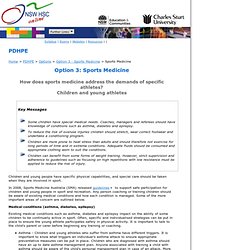
Coaches, managers and referees should have knowledge of conditions such as asthma, diabetes and epilepsy. To reduce the risk of overuse injuries children should stretch, wear correct footwear and undertake a conditioning program. Children are more prone to heat stress than adults and should therefore not exercise for long periods of time and in extreme conditions. Children and young people have specific physical capabilities, and special care should be taken when they are involved in sport. In 2008, Sports Medicine Australia (SMA) released guidelines to support safe participation for children and young people in sport and recreation. Medical conditions (asthma, diabetes, epilepsy) Existing medical conditions such as asthma, diabetes and epilepsy impact on the ability of some children to be continually active in sport.
Overuse injuries (in particular stress fractures) Sports Medicine aged athletes. Home > PDHPE > Options > Option 3 - Sports Medicine > Sports Medicine Key Messages There are many positive benefits of exercise for adults and aged athletes.
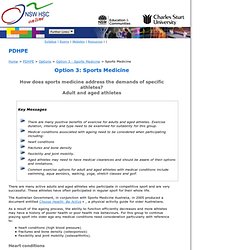
Exercise duration, intensity and type need to be examined for suitability for this group. Medical conditions associated with ageing need to be considered when participating including: heart conditions fractures and bone density flexibility and joint mobility. Aged athletes may need to have medical clearances and should be aware of their options and limitations. There are many active adults and aged athletes who participate in competitive sport and are very successful. The Australian Government, in conjunction with Sports Medicine Australia, in 2005 produced a document entitled Choose Health: Be Active , a physical activity guide for older Australians. As a result of the ageing process, the ability to function efficiently decreases and more athletes may have a history of poorer health or poor health risk behaviours.
Sports Medicine Female athletes. Home > PDHPE > Options > Option 3 - Sports Medicine > Sports Medicine Key Messages Eating disorders, iron deficiency and poor bone density are conditions that can affect female athletes and impede performance.
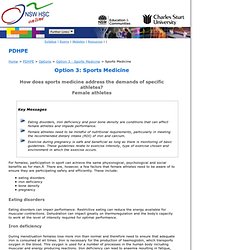
Female athletes need to be mindful of nutritional requirements, particularly in meeting the recommended dietary intake (RDI) of iron and calcium. Exercise during pregnancy is safe and beneficial as long as there is monitoring of basic guidelines. These guidelines relate to exercise intensity, type of exercise chosen and environment in which the exercise occurs. For females, participation in sport can achieve the same physiological, psychological and social benefits as for men. There are, however, a few factors that female athletes need to be aware of to ensure they are participating safely and efficiently. Energy drinks: a trigger for heart attacks and stroke? When a 17-year-old girl, with a potentially life-threatening heart disorder, recently presented to me with an abnormally fast and irregular heart rhythm, I wondered how the natural history of her disease could so abruptly lead to a potentially fatal electrical rhythm disturbance.
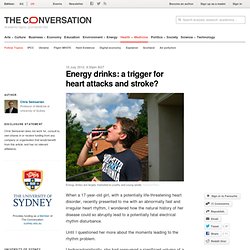
Until I questioned her more about the moments leading to the rhythm problem. Uncharacteristically, she had consumed a significant volume of a popular energy drink. Within an hour, she was in hospital receiving electrical shocks to her heart to bring it back to a normal rhythm. Are sports drinks better than water when exercising? - Health & Wellbeing.
A: Sometimes, it depends on the individual situation Our expert: Profesor Louise Burke and Professor Clare Collins Published 21/07/2011 [Image source: iStockPhoto] Should you take a bottle of sports drink down to the gym when you do that hour's aerobics class?
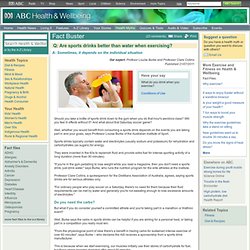
Will you feel ill effects without it? Well, whether you would benefit from consuming a sports drink depends on the events you are taking part in and your goals, says Professor Louise Burke of the Australian Institute of Sport. Sports drinks typically contain water and electrolytes (usually sodium and potassium) for rehydration and carbohydrates (as sugars) for energy.
They were invented in the 60s to replenish fluid and provide extra fuel for intense sporting activity of a long duration (more than 90 minutes). "If you're in the gym pedalling to lose weight while you read a magazine, then you don't need a sports drink, just drink water," says Burke, who runs the nutrition program for the elite athletes at the institute. Use water: Climate control: acclimatising to the heat. Author: Lisa Yates, Sports Dietitian, The Coaches Edge Issue:Volume 27 Number 1 Exercising in hot, humid conditions when the body is not accustomed to it can place the body under great stress.

The demand for circulation to working muscles, which are producing heat, overtakes the need for blood flow to the skin to transport heat away from the body. As a result, body temperature rises. Couple this with dehydration and the risks of heat illness, and poor performance increases.